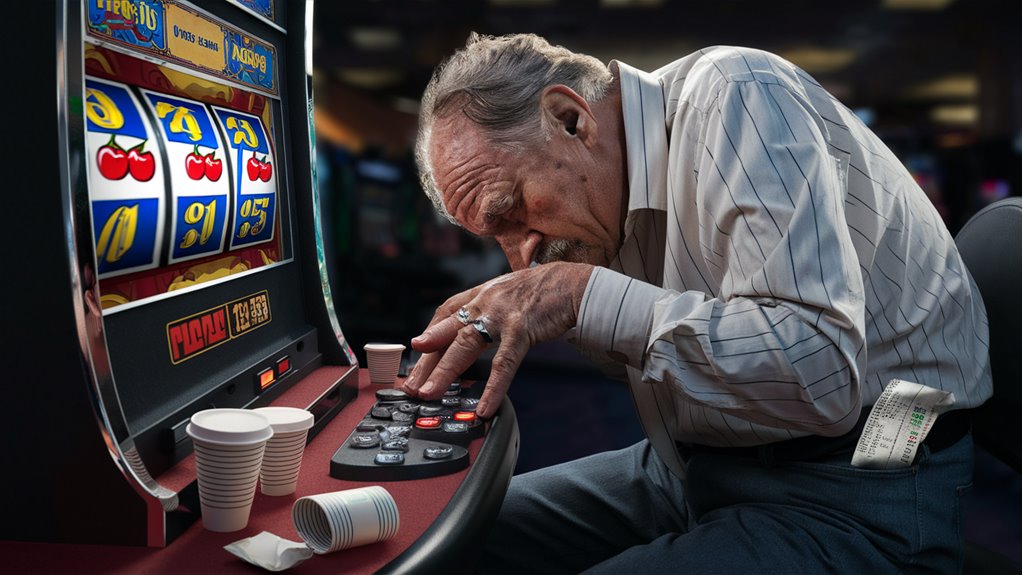Social Gambling: Understanding the Line Between Entertainment and Addiction
The Evolution of Social Gambling
Social gambling was once just the low-stakes card games played between friends. Its current incarnation is a sophisticated digital engine that combines players in the betting house with their friends on platforms like Taobao and seeks to provide an unforgettable gaming experience for all people who take what is at stake seriously.
Psychological Distortion and Risk Features
Psychological impact Social validation and gambling is a powerful dopamine amplifier that will whip punters into a frenzy every time.
Intermittent reinforcement patterns
Social pressure and competition
FOMO-driven engagement
Gamification elements
Signs of Problem Gambling
Problem gambling typically begins with a few key signs of trouble.
Gambling on the platform is now taking longer
The size of gambles goes up over time
Secrecy surrounds one’s gambling activities
Betting and financial problems
Neglecting personal or professional responsibilities
The Social Media Cacophony Effect
The sophisticated interactive machinery behind these social gambling platforms creates an environment where moderate involvement becomes increasingly difficult over time due to peer pressure and constant availability.
Risk Management
Understanding these mechanisms means you can regulate yourself better:
Place strict limits on time and money
Keep a close watch on betting patterns
Be transparent with support networks
Recognize early warning signs
Seek professional help when necessary
This extra understanding of social gambling means users can make informed choices about their participation in these activities.
Modern Social Gambling Defined
Modern Social Gambling: A Complete Analysis
The Digital Gambling Platform Transition
Social gambling has made another leap forward in technology. The game now combines traditional betting mechanics with social media elements and game-like visuals.
These modern platforms blend one’s friends network, achievement systems and competitive leaderboards together while still retaining the basic features of gambling.
Defining Major Features
Modern social gambling includes any betting activity that integrates social networking, be it through independent applications, social media links with other players or even multiplayer capabilities on sites like Facebook.
Three key features define the current scene:
Virtual currency systems, which can be converted into real money
Social interaction tools such as chat functions, gifts (gift exchange), and the formation of teams
Progress mechanics made up of grades, prizes, and stages in tournaments
Fun or Classic Gambling
Social gambling platforms naturally focus more on fun and community activity than the mere bottom line.
Players can use fake coin money for free, which is a far more convenient starting point than traditional gambling required anyone who liked bringing cash home at all.
But these platforms use sophisticated psychological systems such as:
FOMO triggers
Social pressure
Retention mechanisms
The definition of social play compared to gambling changes as developers use increasingly advanced broadcasting methods. This is what most often happens when they create too many rules or charge crazy fees for money earned using your own character in their game.
Rewriting can help you revise and refine content. It ‘s the same as editing, but you might want to rewrite once or twice more before sharing your work with someone else.
Signs of a Problem Gambling
Behavioral Warning Signs
Pathological gambling behaviors are Channeling Arcane Insights for Wheel Mastery often seen to develop gradually in social gambling areas.
Some important signs are spending too long at the betting shop or gambling beyond agreed limits and increasingly large wagers to obtain a given intensity of excitement.
Where money is borrowed for betting, and its source concealed by deception represent a serious danger signal.
Emotional and Psychological Indicators
Emotional triggers are a significant factor in the development of pathological gambling behavior.
Thus, when one uses gambling as an escape from stress or worries (or depression) this is dangerous potential addiction.
Symptoms like nervousness that arises from having nowhere else left to wager and forestalling on-preoccupied bets show psychological dependence.
The neglect of professional obligations, personal relationships, and daily responsibilities further signals problematic behavior.
Financial Red Flags
Financial Warning Signs serve as pivotal indicators of gambling problems.
This is most obvious with “chase betting,” or attempting to recoup losses through continuous gambling.
Other red flags include results that go beyond realistic financial means and hiding wagers from family or close acquaintances.
Timely recognition of these types of problematic gambling patterns enables intervention at an appropriate stage through professional gambling support services. The sooner this is done, the better for those who can be brought back from really severe addiction.
Professional Help Resources
Gambling addiction hotlines
Licensed addiction counselors
Support groups and therapy sessions
Financial counseling services
Self-exclusion programs
Social Networks and Gambling Culture
Impact Promotion Revolution Modern Gambling Culture
Gambling Engagement Transformation In Digital Age
Social media platforms utterly change the behavior of gambling in today’s digital age.
Instagram, Twitter and TikTok: so much gambling-related content all over these platforms – a wealth of it directly accessible. Typical questions include What’s a good place to play this game? Who can I trust with information about games like that now that such-and-such an operator has closed down? It must be revolutionary to advocate bets so directly to people who have never even placed one before.
Advancing Algorithms To Influence
Social media algorithms stand behind the Surging Blackjack Strategies to Outplay the House continuous enhancement of betting-related content and ubiquitous exposure to gambling advice as well as casino highlands in the overview, and sports betting dialogs.
Digital dating influencers often promote gambling through carefully curated content in betting a lifestyle choice. The algorithmic amplification habituates people to gambling behaviour in digital spaces across the board.
Gaming Fusion and Online Currency

The Gamification of Gaming Elements
Social media gaming has Über-complex psychological engagement patterns 1upped even those of games where skill trumps chance. Where gambling is concerned, this has inevitable ramifications.
Virtual currencies and loot boxes represent mechanisms which are a sophisticated reflection of traditional gambling. These features carry particularly serious consequences for youth gambling exposure and perception of risk.
Digital Accessibility Challenges
The advent of mobile gambling through smartphones has brought new challenges to maintaining healthy boundaries in a gambling lifestyle.
Research indicates strong connections between exposure to gambling content through social media and the onset of bad gambling habits. The seamless integration of gambling information in their daily social media interactions exposes people from all age groups to potentially problematic content.
Change in User Behavior and Risk Patterns
Regular interaction with gambling content through social networks significantly increases the likelihood of gambling addictions and other problematic behaviour.
The integration of technology into lifestyle and the surge in mobile access to gambling has created a nearly constant casino environment. We must therefore establish new [digital] wellness boundaries to protect our own and others’ health.
Change in Personal Relationships
The Influence of Gambling on Personal Relationships
Disruption of Intimate Relationships
Completely changing leisure habits of the addict, problem Soft-Power Tactics for Subtle Bet Increases gambling can alter structures so fundamental to human relationships as marriage.
The primary stress factors associated with problems in relationships (stress from financial difficulties and that from alienation) inevitably emerge.
Relations disintegrate with partners hiding or falsifying gambling activities and billings. The gap tills even further in their relationships. To me, at any rate this indicates an increase of long-term injury inflicted on loved ones by themselves in a form more deadly than cancer or disease itself.
Family Impact and Generational Effects
….The regret of sharing a family with a gambling man
The stress on family relationships during an intensification phase of gambling behaviours is severe.
The children of problem gamblers are more likely to display emotional instability and develop maladapted financial attitudes.
There is often a downward spiral within families which can last long into future generations as the wave carries through family systems and eventually rolls downhill.
Social Network Changes
If the friend, relative or acquaintance with whom you placed illegal gambling starts to act very introverted and withdrawn, you should then be aware that (s)he has some problem associated with betting on games.
Sport sloaching, to put it mildly.
The most common of all local cases usually first starts among acquaintances or friends. It soon assumes paths different from those present in organization /kind/Y-type living through both overdosing and enabling each other back into bad habits again. 토토검증업체
These relationships usually take one of two forms: all-out withdrawal or co-dependent enabling, where the behavior continues indefinitely.
The social isolation that follows often leads to mental illnesses such as anxiety and depression that recovery becomes nearly impossible; even if an individual does find their way back into society he is likely, in most cases, unable to restore any semblance of a normal interpersonal relationship with others.
Effects on Support Systems
Marriage trust dwindles
Family financial disorder
Close relationship emotional distance
Children’s behavior changed
Social network decline
Mental illness
Prevention and Responsible Gaming Strategies
A Boundary for Playing and Limit Setting
All responsible gambling starts from the confines.
Set a definite time and amount of money limitations before any gambling operation. Always use dedicated tracking tools to monitor your expenditures accurately.
Keep detailed records you can account for and review as you wish.
Effective Preventive Tools
Self-exclusion programs represent a powerful weapon to stop gambling problems: with certainty, a person can now deliberately shackled himself within virtual chains that prevent entry into gambling platforms.
Reality check alerts can remind users of spending amount or time sensitivity near gaming limits; but blocking software will technically block people from visiting any casino website.
Signs and Positive Support Chasing Losing
It is vital to recognize the beginnings of problem gambling. Some key indications include:
Doubling or trebling bets-Increasing bets to chase feeling that came from earlier bets is another classic example of something that just will not work out.
Neglecting personal or professional responsibilities
Cognitive-behavioral therapy is aimed at breaking the grip of underlying triggers and patterns of thought that reinforce gambling urges.
Professional counseling combined with support groups such as Gamblers Anonymous provides a comprehensive recovery framework.
Building Support Networks
Find a good support system and contemporary research into gambling recovery success is in agreement with what two centuries of wisdom tell us.
Regularly converse with trusted family members and friends can provide indispensable feedback. Such people not only decree your gambling tendencies, but also give emotional support if needed, keep you where commitment levels might otherwise falter and watch for potential instances of backsliding into gambling once more.










